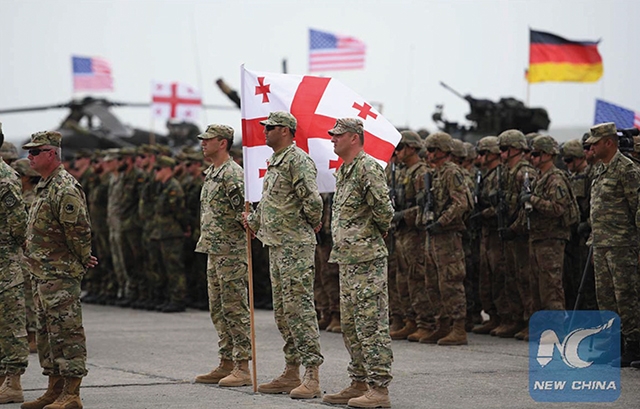Noble Partner & Why It Matters
Every year it’s the same; legions of American, British, French and other European soldiers flock to the plains south of Tbilisi for an annual training exercise. Russia furrows its brow and exclaims its objections, and western politicians applaud as the tankers and infantrymen slog it out in the late summer Georgian heat. To the untrained eye, it’s merely a hollow political gesture. However, Noble Partner means so much more.
Critics write litanies about the divide between NATO’s Counter-Russian mission and Georgia’s future, but there is more at play in the hills of Krtsanisi than just military drills. What is missed by these decriers is the tactical importance of a repeated training deployment in the region. With the aggression promulgated in South Ossetia, Eastern Ukraine, and Syria, Russia has made its intentions clear.
As with many of the post-Soviet republics that have pulled themselves out from relative obscurity, Georgia has done notably well in the defense sector. With considerable contributions in the NATO operations in Iraq and Afghanistan, Georgia has modernized beyond most other Eastern European nations. Georgia has its own successful private defense sector in the form of DELTA, which produces everything from armored vehicles to high-precision marksmen rifles and are sold all over the world. With the assistance and guidance of NATO, Georgia is a rising star.
Noble Partner is the tip of a growing iceberg of cooperation with Europe and the US. The Caucasus remains a strategically important region. With Armenia becoming more and more cozy with the Russians, and Azerbaijan remaining reluctant to swing too far to the west, Georgia is the key to stability. Despite this close friendship, Noble Partner may not be enough to keep the Georgians involved in the comprehensive defense strategy.
Just as the US forces have begun to shift into Poland and the Baltic Countries on a more permanent basis, Georgia is another key staging area in the world, and a huge deterrent to Russian and Chinese aggression. A more permanent stationing of US and European forces is necessary, and an expansion of training and support operations is vital. Gone are the days of standing by while opposing regimes with histories of territorial sovereignty abuses are allowed to sew their seeds. And as a result, Georgia is more important than ever.
Another similar model is that of NATO in the early years in West Germany. As a matter of deterrence and rapid reaction, NATO’s postings in the area acted as an insurance plan against Soviet aggression. Georgia finds itself in a similar position, including the occupation of its sovereign territory. As a result, it is imperative that there be a permanent, or at a minimum a semi-permanent, regional task force stationed in Georgia.
What would that look like? The Polish model is a working example of this type of cooperation. The US alone has elements of division level command and control units, an approximately 750-person logistics and support hub that is also connected with Lithuania, and an Armored Cavalry Regiment comprising of just under 1,000 personnel. In addition, there are Naval and Air Force elements, with responsibilities including air interdiction squadrons as well as naval missile defense systems. This is not to mention the additional British and European forces.
The obvious reason for this size of regional force deployment is the location of the Russian forces based around the military city of Kaliningrad. But Georgia is still not so different. The Russian 4th and 7th military bases located in South Ossetia and Abkhazia respectfully already put enough pressure to warrant a NATO garrison. In addition, the massive military presence in Vladikavkaz (58th Army), Stavropol (49th Army), and Krasnodar (7th Air Assault Division) should provide plenty of reason for a buffer element of NATO contingents.
In addition to the posting of a NATO task force garrison, the natural side effects of increased cooperation and cohesion between NATO forces and the Georgian Defense Forces are invaluable. The Poles know this is an effective strategy, and the Baltic states sleep better at night knowing that aggression from the east is far less likely with NATO nearby. Georgia stands to benefit greatly from this knowing that any northern aggression will not be tolerated. This is not to mention the exposure of US and European troops on rotation, sharing experiences of their down time in Tbilisi and the economic boost from additional US dollars and Euros going to local business.
And finally, the Government of Georgia knows they need to keep a warm relationship with the West. In doing so, they stand to come out of the situation looking better not just to their international neighbors as being a bold and decisive leader in the Caucasus, but also to the Georgian populace. The people have been looking to the President and Parliament to assurance that their way of life is secure. Bringing in NATO as a more permanent partner, and as a result a new neighbor, would only benefit the nation as a whole and usher in a new era of peace for the region.
By Michael Godwin












